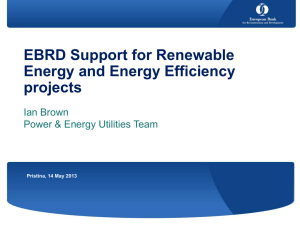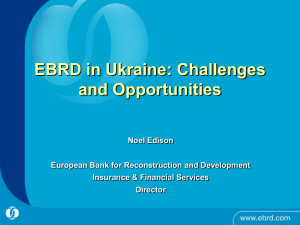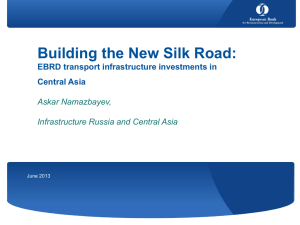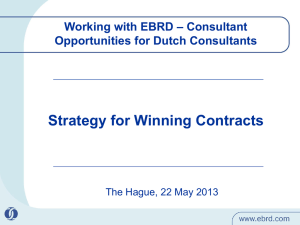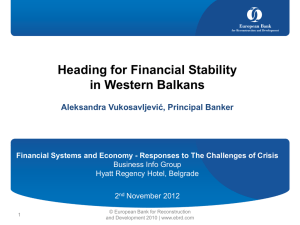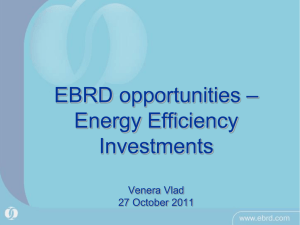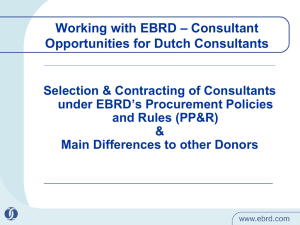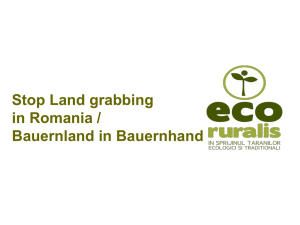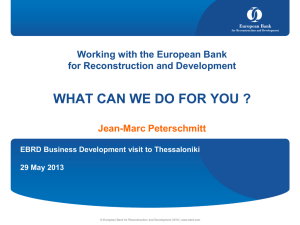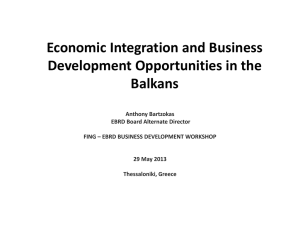Financial Institutions 2003
advertisement
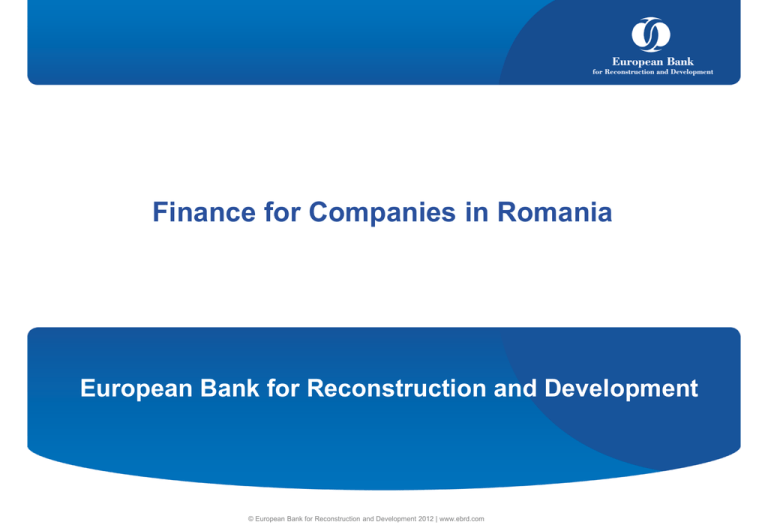
Finance for Companies in Romania European Bank for Reconstruction and Development © European Bank for Reconstruction and Development 2012 | www.ebrd.com Executive Summary What is the EBRD? — AAA rated international financial institution — Largest lender and private equity investor in CEE and CIS (current portfolio of more than €36.9 billion) — Largest investor in Romania (more than €5.6 billion) Key advantages — Strong, internationally recognised financial partner — Political leverage due to EBRD’s unique mandate and shareholder structure — EBRD's reputation due to thoroughness of due diligence and choice of local partners Working with the EBRD — Direct financing of companies — Wide range of financing structures customized to project characteristics — Debt, Equity, Quasi-equity/Mezzanine 2 Five reasons we are different • • • • • A reliable and stable partner with a local team committed to Romania that has no funding constraint, staying with its clients in difficult times Offering flexible debt, mezzanine and minority equity financing with a long term perspective and possibility of repeat financing Able to add value through: – – – – Specialist due diligence expertise in energy efficiency, environment, industry sectors and equity structuring Strong relationships with State institutions Our network throughout the region Our reputation Strong capacity to mobilise commercial co-financing for larger and more complex transactions involving complex investment plans, restructuring or reorganisations, and complex financing structures with many parties Ability to address the middle market. Very good partner for local entrepreneurs that adds value at the board level but is one of the few financial investors willing to take a minority stake 3 Don’t just take our word for it • • EBRD understood our complex funding requirements and worked tirelessly with us to build a solution and mobilise other banks – Marian Nastase, CFO Alro/Vimetco EBRD was able to provide the right form of financing structure which enabled Kaufland Romania and Lidl Romania to expand faster in more remote and deprived regions of Romania. EBRD has also been a valuable partner and has supported Kaufland and Lidl in their efforts to become more conscious of the socially and labour aspects of their operations – Karsten Dahlem, Geschäftsführer Finanzierung International, Schwarz (Kaufland/Lidl) • • • EBRD helped me grow my business from a start up to a significant player in the tissue market – Ioan Tecar, majority shareholder, Pehart The funding requirements of our growing business evolved rapidly but EBRD were adaptable enough to provide solutions – John Ball, President UAC Europe EDRD is supporting our strategy of rapidly developing digital and broadband services which will increase its competitiveness – Dinu Malacopol, CEO Digital Cable Systems 4 Table of Contents 1. Introduction to EBRD 2. EBRD Financing Approaches 3. Case studies 5 1. Introduction to EBRD 6 What is the EBRD? An international financial institution established in 1991, owned by the governments of 63 countries and 2 intergovernmental institutions (EU, EIB) Shareholders Breakdown Headquartered in London, the EBRD invests in 29 countries from Central and Eastern Europe to Central Asia Office in Bucharest for 20 years with 16 bankers In 2011, the Bank expanded its operations to include Egypt, Morocco, Tunisia, and Jordan EBRD has a AAA rating from all three main rating agencies (S&P, Moody’s and Fitch) Note: As of September 1st, 2010 Footnotes (1) Includes European Community and European Investment Bank each at 3%; France, Germany, Italy, UK each at 8.6% (2) 7 Russia at 4% Where we operate 8 EBRD since 2000 • • – – • • • Facilitates inward and cross-border investments in the region 80 70 Works with locally owned as well as international companies Private sector focused 60 50 Direct financing of companies € Billion • Indirect financing through local banks Finances projects in all sectors A capital base of €30 billion and circa €71 billion cumulative commitments 380 new projects signed in 2011 with total commitments of over €9 billion 40 30 20 10 0 '00 '01 '02 '03 '04 '05 '06 '07 '08 '09 '10 '11 Cumulative commitments of circa €71bn Unaudited as at 31st December 2011 9 EBRD in Romania • Cumulative number of projects: 314 • Total project value: €16.5 billion • Net cumulative business volume: €5.7 billion • Cumulative disbursements: €4.7 billion • Private portfolio share: 76% • Portfolio: €2.9 billion 10 EBRD: Key Sectors in Romania The EBRD’s focus is on: the corporate sector (manufacturing, agribusiness and ICT) 721 700 117 595 600 € Million financial institutions (SME targeted and energy efficiency loans) 800 449 500 315 400 317 326 103 300 200 85 257 263 289 100 - 2008 energy and energy efficiency infrastructure (including co-financing with EU structural funds) 11 184 60 83 2009 2010 2011 Corporate Energy&Infrastructure Financial Institutions Total Romania – 2011 Highlights 30 projects for around €450 million, mostly private sector 40 per cent of these focused on energy efficiency syndicated over €170 million and mobilised over €1.4 billion of financing In the commercial sector: – Mezzanine financing for Industrial Mecano, a local packaging company – Equity investment in Green Park, a recycling businesses – Senior loan to Energobit to finance its energy efficiency subsidiary – Syndicated loan to oilseed crusher Expur – Loan to Agripoint Port Terminal, to expand a grain logistics facility in Constanta 12 2. EBRD Financing Approaches 13 EBRD: Financing Structures Tailored to Project Needs • • • EBRD operates commercially and can offer longer tenors, local currency loans in selected countries and other innovative products EBRD is willing to share commercial risk under different financing structures EBRD invests in a broad range of instruments across the capital structure with various types of debt and equity participations: Debt – – – – Senior, subordinated, or convertible loans Long term (up to 10 years or more) and short term loans Floating or fixed rate loans USD, Euro, or RON loans Equity – – – Minority positions (usually up to 35%) Common or preferred stock Mezzanine finance Other instruments – – Guarantees Currency swaps 14 EBRD: Financing objectives • • Through its investments in commercially sound projects, the EBRD aims to promote open market economies in its countries of operation EBRD’s key objectives in financing companies are as follows: – – – – – – – Support private and entrepreneurial initiatives by engaging in long term partnerships to help developing businesses Be additional to private sector finance by participating in projects that commercial banks or private investors are reluctant to undertake Engage in policy dialogue with authorities, where necessary, to improve regulatory and legal frameworks for business Be a leader in supporting strong corporate governance, introducing best practices and raising industry standards Mobilise significant foreign direct investments, supporting companies in unfamiliar and sometimes challenging environments Provide a wide variety of financing alternatives, innovative products, and international sources of funding to help support companies to the next stage of development Encourage environmentally sound and sustainable development by identifying cost effective energy efficiency investments within every project 15 EBRD: Investment terms • Flexibility of instruments offered –equity, quasi-equity, loans plus combinations • Capacity to invest between €4/5 million and €200 million • Equity: minority investor only – up to 35% • Debt/mezzanine: up to 35% of total balance sheet or project costs • Appetite for risk whilst supporting, rather than replacing, private investors • Focus on environmentally sound projects 16 EBRD: Debt Finance • Maturity and interest rates depend on the project’s risks associated with the project structure, client and market conditions • EBRD can offer longer maturities than the commercial banks • EBRD can provide large amounts of finance where needed • Availability of financing for long term working capital • Excellent relationships with commercial banks: access to commercial co-financing • Loan Syndications (A/B structures) • Mezzanine / subordinated debt 17 EBRD: Equity Investments • • • Companies that cannot expand with debt alone Owners who see the benefits of sharing equity and EBRD support in strengthening corporate governance Growth potential and strong competitive prospects in local markets and export markets • Sound financial basis and financing plans • Well-developed business plans and capacity to implement them • Clear exit route for the Bank – sale to strategic or financial investor or an IPO • Typical holding period for the Bank is 4-6 years 18 EBRD: Project Cycle • • • Provided all necessary information is available, a project from Origination to Board Approval typically takes 3 to 6 months, depending on the complexity, length of negotiations and other factors Stages of Project Cycle 9. Com pletion The total project cycle from origination to final repayment can range from 1 year, for working capital or trade financing projects, to 10 years for long term investments EBRD financing in individual projects has ranged from less than €1 million to more than €150 million 1. Origination 2. Concept Review 8. Sale of Equity 3. Structure Review 7. Repaym ents 6. Disbursem ents 5. Legal Docum entation & Board Approval 19 4. Final Review Sectors of Expertise • • Agribusiness. Entire food chain: – – – – – – Agricultural inputs Production Primary processing Food processing Food packaging Food services and distribution • Property & Tourism: – – – – – Offices and business centres Logistics centres and warehousing Retail malls Manufacturing & Services: – – – – – – – – – – Hotels and resorts Property Funds • Information & Communications Technology – – – Broadcasting and Communications Information Services and Data Processing Knowledge economy 20 Metals: steel and non-ferrous metals Capital and intermediate goods Automotive Forestry and paper Construction materials Chemicals Health and pharmaceuticals Consumer goods Logistics and retail Aerospace industry Romania: Selected Clients • Clients of the EBRD in Romania range from major international industry players to local medium and small sized companies 21 3. Case Studies 22 Pehart Tec Romania Project Summary Client Pehart TEC Signed in 2009 Country Romania Product Equity Sector Pulp&paper Amount EUR 6mn Highlights • Pehart Tec Romania is the third largest player in Romanian tissue production sector. Its sales include tissue paper (from pulp) and finished products (from tissue). The company has its own brand, Pufina, and sells its products to large retail chains such as Metro, Lidl, Auchan, Profi and Cora. It exports to Germany, Hungary, Greece, Bulgaria and Serbia. • EBRD provided EUR 6 million for a 25% share of the company’s equity. The funds were used to by investing in a new paper machine and converting line. The purpose of the Bank’s financing was to support the Company to focus on finished products with higher added value. • EBRD’s value added is threefold: it provided new capital with no immediate impact over the cash flow; it is a reputable partner who helped improve the company’s corporate governance; the Bank’s Board member is a very experienced consultant in the industry who supported the company in developing its products and marketing strategy 23 Renault Technologies Romania - Titu Test Centre Project Summary Client RTR Signed in 2009 Country Romania Product Portage equity Sector Automotive Amount EUR 44mn Highlights • • • Renault started operating in Romania in 1999 when it acquired 51% of Dacia SA when it was privatised. Renault incorporated Renault Technologie Roumanie (RTR) in 2006 with the aim to develop the engineering capabilites outside France EBRD provided EUR 44 million portage equity finance for building Titu Test Centre, Renault’s largest test centre outside France and one of the very few investments in automotive engineering in Central and Eastern Europe or the former Soviet Union. EBRD supported the projects as it promotes links with local universities and other academic institutions and improves the technological level and quality of components produced by local suppliers through closer contact and more rapid feedback 24 Alro Slatina Project Summary Client Alro Signed in 2010 Country Romania Product Syndicated Loan Sector Non-ferrous metals Amount USD 180mn Highlights • • • • Listed on the Bucharest Stock Exchange, Alro is the largest aluminium smelter in southeast Europe and one of Romania’s largest industrial companies, employing over 3,300 people. It is majority owned by Vimetco NV, a vertically integrated producer of primary and processed aluminium products Due to the global crisis, Alro’s existing debt structure affected the financial flexibility of the company, putting a considerable strain on cash reserves. This had a negative effect on the ability of the company to pursue its strategy of shifting towards higher value added products EBRD provided a USD 180 million refinancing package (USD 105million syndicated) to Alro in order to consolidate its financial structure, help the company move into higher value added products and improve energy efficiency EBRD’s investment will allow Alro to proceed with a USD 50 million investment program between 2010 to 2012, which focuses on improving the quality and range of its products and includes significant energy efficiency improvements 25 UAC Europe Project Summary Client UAC Europe Signed in 2012 Country Romania Product Senior debt + Mezzanine Sector Aerospace Amount EUR 25mn Highlights • • • • • UAC Europe is the Romanian subsidiary of Montana Tech Components (“MTC”). UACE started the production of aluminium alloy profiles for the aerospace industry in 2009 at its site in Dumbravita, Maramures MTC is a Swiss-Austrian industrial group founded in 2006 with operations in hi-tech niche manufacturing through three main divisions: Aerospace and Industrial Components; Special machinery for product identification in the metallurgical sector and Energy Storage – button cell batteries The EBRD funding will be used to support the development of additional operations: machining, surface treatment and assembly operations in Dumbravita and increasing UACE’s added value output Upon completion of the EBRD investment in 2014, UACE will be able to supply aerospace manufacturers like Airbus/EADS, Alenia or Boeing with locally produced components The EBRD is boosting Romania’s presence in the global aerospace industry 26 Green Group Project Summary Client Green Group Signed in 2011 Country Romania Product Equity Sector Recycling Amount EUR 6.8mn Highlights • • • • Green Group is the only waste recycling integrated park from Romania and was set up following the acquisition of the majority stake by Global Finance’s South East Europe Fund (SEEF) in consortium with EBRD from Romcarbon Green Group consists of GreenTech SA (PET bottles recycling), GreenFiber Internațional SA (PET fiber producer), GreenWEEE Internațional SA (WEEE recycling) și GreenLamp Reciclare SA (lamp and baterries recycling) The total investment value of EBRD and SEEF in Green Group reached EUR 22.7 million. The project represents a major capital transaction in the recycling industry field and will sustain the Green Group’ strategy in becoming the most important waste recycling park from SE Europe South East Europe Fund is a private equity fund managed by Global Finance, an independent investment firm that pioneered private equity in the region. The EBRD is one of the anchor investors in SEEF 27 Danone Project Summary Client Danone Signed in 1995 Country Russia, Bulgaria, Romania, Poland Product Equity / Multi-project facility Sector Dairy Amount USD 100m Highlights • • • • Danone – global leader in fresh dairy and bottled water production Long-term partnership in the region US$100m multi-project facility for equity co-investments The Multi-Project Facility (MPF) was expected to have a strong transition impact, as it would help with the restructuring of the food industry in the areas of primary production and packaging as well as marketing and distribution. It will also help to develop technological and management know-how throughout the food industry as a result of continuous support from Danone and the training of local personnel. Sub-projects: • • investment in dairy companies in Bulgaria and Romania construction of a dairy plant in Russia and acquisition of biscuit plants in Russia and Poland 28 Cora Project Summary Client Louis Delhaize / Cora Signed in 2012 Country Romania Product Term loan Sector Retail Amount EUR 210m Highlights • • • • Louis Delhaize is one of the leading European retailers operating in France, Belgium, Luxembourg, the UK, Romania and Hungary. The company operates the Cora hypermarkets in Romania. The proceeds were used to finance expansion of Cora hypermarket chain in Romania, most of which will be carried out in regional. Total project cost of EUR 397 million The expansion of the Cora hypermarket chain in Romania (mostly in regional cities) is expected to generate strong linkages with local suppliers, thus providing the latter with new commercial opportunities with a reliable counterparty. The Project will also showcase the successful implementation of advanced sustainable energy solutions in retail building 29 Expur Project Summary Client Expur / Saipol Signed in 2010 - 2011 Country Romania Product Term loan and revolving loan Sector Oilseed processing Amount EUR 110m Highlights • • • • Expur S.A. engages in the procurement, crushing, and processing of sunflower seed and rapeseed for the Romanian market and for export. The end products include edible sunflower oil, meal from sunflower seed and rapeseed, and biodiesel. The project includes expansion and upgrading of the plant and financing of working capital needs The EBRD loans are expected to facilitate market expansion and competition by introducing new products to the Romanian market to give customers greater choice for a better value compared to imports. A demonstration effect will be achieved through the introduction of new technology and production efficiencies, as well as and knowledge and skills transfer. All loans were syndicated to commercial banks. 30 How to contact EBRD Romania Team: Peter Stredder, Acting Country Director, Romania (until 31.12.12) James Hyslop, Country Director, Romania (as from 1.1.13) Anca Ionescu, Regional Senior Banker Romania, Bulgaria & Moldova Ovidiu Morariu, Principal Banker, Industry Commerce and Agribusiness Cristian Antoci, Associate Banker, Agribusiness Dragos Iliescu, Associate Banker, Industry Commerce and Agribusiness Matei Anghelescu, Senior Analyst, Industry, Commerce and Agribusiness Contact: West Side, Metropolis Center, Bd. Iancu de Hunedoara 56-60, Sector 1, Bucharest Tel: +4021 202 7100 SurnameX(name’s initial)@ebrd.com except: StreddeP@ebrd.com and AngheleM@ebrd.com 31
